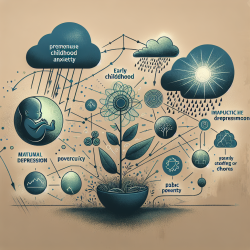Introduction
The complex relationship between posttraumatic stress disorder (PTSD) and those who have been involved in prostitution is a critical area of study. Recent research, "Symptoms of Posttraumatic Stress Disorder and Mental Health in Women Who Escaped Prostitution and Helping Activists in Shelters," sheds light on the mental health challenges faced by women who have escaped prostitution and the field workers who support them. This blog will explore the findings of this study and discuss how practitioners can enhance their skills by applying these insights.
Research Insights
The study assessed 113 female ex-prostitutes living in shelters, 81 helping activists, and 65 control subjects. It revealed that ex-prostitutes experienced significantly higher stress responses, somatization, depression, and PTSD symptoms compared to the other groups. Notably, the activists also exhibited higher tension, sleep, and smoking problems than the control group, indicating vicarious trauma effects.
Understanding Vicarious Trauma
Vicarious trauma refers to the psychological impact on individuals who are indirectly exposed to traumatic events through their work with trauma victims. This study highlights the need for mental health support not only for the direct victims of trauma but also for the field workers who assist them. The activists in the study reported higher levels of PTSD symptoms, suggesting that their proximity to trauma has significant psychological effects.
Implications for Practitioners
- Recognize Vicarious Trauma: Practitioners should be aware of the signs of vicarious trauma in themselves and their colleagues. Regular training and support can help mitigate these effects.
- Implement Support Systems: Creating a robust support system for field workers, including counseling and peer support groups, can help manage stress and prevent burnout.
- Encourage Self-Care: Practitioners should prioritize self-care and stress management techniques to maintain their mental health while supporting others.
Encouraging Further Research
While this study provides valuable insights, further research is needed to develop effective interventions for vicarious trauma. Practitioners are encouraged to participate in or support research initiatives that explore the psychological impact of trauma work and develop strategies to support field workers.
Conclusion
The findings from this study underscore the importance of addressing the mental health needs of both trauma survivors and the field workers who support them. By recognizing and addressing vicarious trauma, practitioners can improve outcomes for all involved. To read the original research paper, please follow this link: Symptoms of Posttraumatic Stress Disorder and Mental Health in Women Who Escaped Prostitution and Helping Activists in Shelters.










